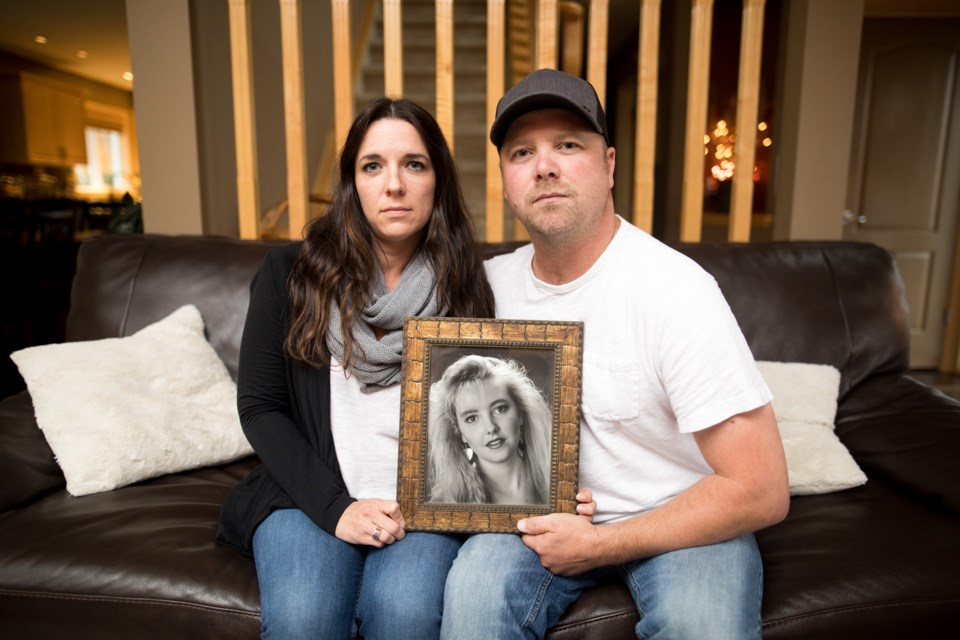OKOTOKS, Alta — The family of a young woman murdered by her ex-partner is pleased to know he will remain custody for the foreseeable future.
Tristan Ryan, formerly Bradley Paetsch, was found guilty of stabbing his ex-girlfriend Stephanie Spooner to death in her Okotoks home on Jan. 23, 1991.
She was 16 years old.
“We were extremely happy with the outcome yesterday,” Robin Spooner, who is married to Stephanie’s brother Rene, said Thursday. “We feel the board made the right decision.
“We feel that we’ve been heard.”
A Parole Board of Canada hearing took place virtually Wednesday, with Ryan appearing via video conference from the Drumheller Institution alongside a parole officer. His request to receive day parole – which would allow him to visit his wife, whom he married from jail in 2015 – as well as attend church service was ultimately denied.
Ryan, who was 18 at the time of the crime, previously served six months in a juvenile facility for attempting to stab Stephanie a year prior.
He was convicted of first-degree murder for the crime and served 27 years of a life sentence before being granted full parole in 2018, but was back behind bars a year later for parole violations.
Even after 31 years, Robin said dealing with the situation is “a never-ending hell,” especially when the family is constantly being dragged back into his regular requests for parole.
“We got what we wanted this time, in terms of him not being released and having day parole,” she said. “But we are probably going to be in this same situation a year from now when he goes for day parole again.
“We’ll be in this situation in 2025 when he has the opportunity to go for full parole and we could be in this situation even sooner than a year if he applies for escorted absences.
“This is something we have been dealing with for many, many years.”

She uses the word ‘peace’ lightly but said the only time her family felt remotely peaceful was the 25 years where he was ineligible to apply for anything.
The convicted murderer has been back in custody since September 2019 after having his parole revoked when, in a period of separation from his wife, he struck up a relationship with a woman he met in an online chat room.
He had also been told to cease communication with his wife and instead contacted her family. At this time, Ryan also made several social media posts that were allegedly angry and manipulative and accused his wife of cheating. The posts also contained comments on sexual assault.
These actions, alongside the violation of his conditions by not reporting the new friendship, resulted in him being sent back to prison.
Throughout his most recent stay in prison, he has moved between minimum and medium security due to three separate instances of positive THC uranalysis, the latest of which was in September 2021.
He blames this relapse on the loss of his stepdaughter from COVID-19 that same month.
Two members of the Parole Board of Canada oversaw the virtual July 6 hearing, ultimately deciding it best for him to remain in the minimum-security section of the Drumheller Institution where he has been since April.
The parole officer present with Ryan indicated it was her recommendation for him to remain in custody, citing his continued lack of empathy for the victim and the victim’s family, his continued substance abuse and the lack of implementation of skills learned through various programming.
The board agreed, stating in its decision that Ryan needed more time in custody to show his overall stability and establish appropriate coping mechanisms for negative or stressful situations.
When asked about his perceived indifference or remorse for his crime, Ryan claimed he understands the pain of Spooner’s family even more after the loss of his stepdaughter.
This didn’t sit well with Robin and her family, who said they have consistently maintained that he lacks empathy.
“It came across to me like he was trying to use it to his benefit,” she said.
“The death of a child, I could not imagine, that is a horrible thing to experience. However, for him to come close to even comparing [the two] – his stepdaughter didn’t die at the hands of another.
“So, for me, to classify or for him to even remotely say that he understands is extremely disrespectful.”
Ryan was adamant that his past parole violations don’t diminish the work he has done on himself throughout his time in prison and that relapses are part of addiction. He claims he has made progress through counselling, finding faith as a Jehovah’s Witness and through prison programs, though he claimed access to these supports is limited in his current circumstances.
Despite the pain and anguish these hearings bring about for Stephanie’s family, Robin said the Spooners are not going away.
“As long as he is still alive, we will continue to fight for Stephanie,” she said. “We will be at every hearing; we will be with it every step of the way and we will never go away.”



